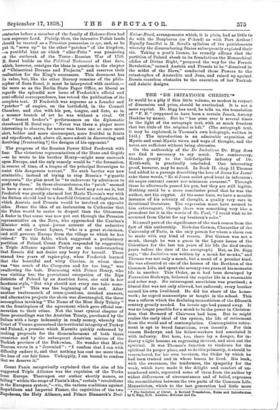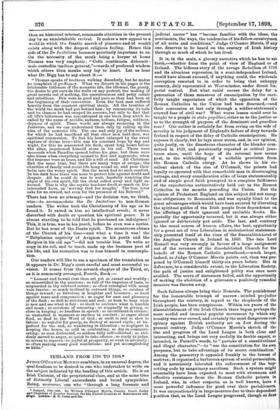THE "DE IMITATIONE CHRISTI."
IT would be a pity if this little volume, so modest in respect of dimension and price, should be overlooked. It is not a mere reprint. Dr. Bigg has used, he tells us, the translation of "F. B." (supposed to have been a certain Jesuit, Antony Hoskins by name). But he "has gone over it several times in the light of the autograph text, with so much freedom that but little of the original is left." (The autograph text, it may be explained, is Thomas's own holograph, written in 1441.) The introduction is an admirable exposition of Mystic and semi-Mystic views and ways of thought, and the notes are sufficient without being obtrusive.
On the authorship of the Ds Imitations Dr. Bigg does not find it necessary to say much. The controversy, thanks greatly to the indefatigable industry of Dr. Kettlewell, is practically concluded. One interesting proof, however, may be noted. In Book II. chap. 11 Thomas had added to a passage describing the love of Jesus for Jesus' sake these words, "Et si Jesus uellet quod irent in infernum:. ibi aeque contenti essent nec minimum curarent." Through these he afterwards passed his pen, but they are still legible. Nothing could be a more conclusive proof that he was the author, not the copyist. At the same time, we have a notable instance of his sobriety of thought, a quality very rare in devotional literature. The expression must have seemed to him extravagant, though there was something very like a. precedent for it in the words of St. Paul, "I could wish to be accursed from Christ for my brethren's sake."
No small part of the significance of the work cornea from the fact of this authorship. Nicholas Gerson, Chancellor of the University of Paris, is the only person for whom a claim can be made with any kind of reason. But Gerson was not a. monk, though he was a guest in the Lyons house of the Celestines for the last ten years of his life (he died twelve years before the date of the autograph). But, as Dr. Bigg says, "the Imitation was written by a monk for monks," and. Thomas was not only a monk, but a monk of a peculiar kind. He was educated at one of the houses of the Brethren of the Common Life, and spent the seventy-two years of his monastM life in another. This Order, as it had been developed by Florentine; Radewyn, followed the regular life in a reasonable and sober way. No extravagant asceticism was practised; a. liberal diet was not only allowed, but enforced; every brother earned his own livelihood. He did his share of the house- work ; he copied manuscripts or taught in the school. This was a reform which the declining monasticism of the fifteenth century greatly needed. Its heroic age had passed away. It was no longer possible for a monk to be the power in Christen- dom that Bernard of Clairvaux had been. But he might realise the early ideal of the system, the life of retirement from the world and of contemplation. Contemplative retire- ment is apt to breed fanaticism, even insanity. For this reason Radewyn and his fellow-workers had associated it. with industry. But here, too, there lay a danger, for in- dustry a light become an engrossing interest, and shut out the spiritual. It was Thomas's function to vindicate for the spiritual its proper place, and to do this primarily, it should be remembered, for his own brethren, the Order by which he had been trained and in whose bosom he lived. His book„ with the sweetness, the tenderness, the sympathy for the weak, which have made it the delight and comfort of un- numbered souls, separated some of them from the author by widest differences of circumstances and of belief, expresses the reconciliation between the two parts of the Common Life. Monasticism, which to the last generation had little more • The Imitation of Mist. .& Revised Translation, Notes and Introdnattela by 0. Bin, D.D. London; Idetnnen and Co. than an historical interest, commands attention in the present day by an unmistakable revival. It makes a new appeal to a world in which the frantic search of pleasure and of wealth exists along with the deepest religious feeling. Hence this eide of the De Imitutione becomes peculiarly important to us. On the necessity of the monk being a keeper at home Thomas was very emphatic : "Celia continuata dulcescit : male custodita laedium generat,"—words of profound wisdom which others than monks may lay to heart. Let us hear what Dr. Bigg has to say about it Thomas speaks of brethren walking disorderly, but be makes no complaint of profligacy. What we discern in his pages is the intolerable littleness of the monastic life, the idleness, the gossip, -the desire to get outside the walls on any pretext, the making of great secrets out of nothing, the querulousness and petty cabals and rebellions. Few were as good and pure as they had been at the beginning of their conversion. Even the best men suffered heavily from the constant spiritual strain. All the troubles of -the world the monk had put behind him; by renouncing its toils and its chances he had escaped its sorrows, but only to find that all life's bitterness was concentrated in one black drop which he called by the name of Accidie, sadness, tedium, fatigue, coldness, -dryness of spirit. These words are always recurring in the Imitation, and we can understand them only by calling up the -idea of the monastic life. The one and only joy of the recluse, for which be had sacrificed all that other men held dear, was ,spiritual communion. To feel his heart enlarged by the sweet rapture of divine love—this was his constant hope by day and night, far this he macerated his flesh, spent long hours before -the altar, imprisoned himself alone in his cell. There were moments when Paradise opened before his gaze, but there were also times when everything seemed to fret and aggravate, when the heavens were as brass, and life a hill of sand. All Christians find the same trial, but there are many ways of escape; the -charities of family and social life hang round us, and pour their 'balm into the weary spirit. But the monk had no such comfort. In his dark hour there was none to protect him against doubt and 'despair. All he could do was to wait, fearfully watching the abyss of his own spirit, till the cloud rolled away and light re- turned. This is why the mystic teachers dwell so much on Dis- interested Love, on 'serving God for nought.' The true lover asks for no reward, not even for the presence of his Beloved."
'There has been no attempt—and the decision was, we think, -wise—to accommodate the De Imitatione to non-Roman readers. The writer took the Christianity of his age as he found it. It raised in him no intellectual revolt; it never disturbed with doubt or question his spiritual peace. It is almost startling to be told that he purchased an indulgence ! 'This, it is true, was in his youth, before he even was a novice. Bat he has none of the Dante spirit. The monstrous abuses of the Church of his time—and what a time it was ! the 4‘ Babylonian captivity of Avignon in his youth and the Borgia& in his old age "—did not trouble him. To write or .copy in his cell, and to teach, made up the business part of his life, and his recreation was to lose himself in contempla- tion.
Our readers will like to see a specimen of the translation as it appears in Dr. Bigg's most careful and most successful re- cision. It comes from the seventh chapter of the Third, or, as it is commonly arranged, Fourth, Book :—
"Lament and bewail that thou art yet so carnal and worldly ; so unnuertified in thy passions : so full of the impulses of lusts, so unguarded in thy outward senses ; so often entangled with many vain fancies : so much inclined to outward things, so careless of things inward ; so frivolous in laughter and looseness: so hard against tears and compunction ; so eager for ease and pleasures of the flesh : so dull to strictness and zeal; so keen to hear what is new and see what is fair : so slack to embrace what is humble and mean ; so covetous of amassing : so niggardly in giving, so -close in keeping ; so heedless in speech : so incontinent in silence ; so unstudied in manners so restless in conduct : so eager about food, so deaf to the Word of God ; so swift to rest so slow to labour : so wakeful for gossip, so drowsy at sacred vigils ; so im- patient for the end, so wandering in attention : so negligent in keeping the hours, so cold in celebrating, so dry in communi- cating; so soon distracted, so seldom fully self-collected : so sud- denly moved to anger, so quick to take offence ; so ready to judge, so severe to reprove: so joyful at prosperity, so weak in adversity ; so often making many good resolutions : and yet accomplishing eo little."



































 Previous page
Previous page